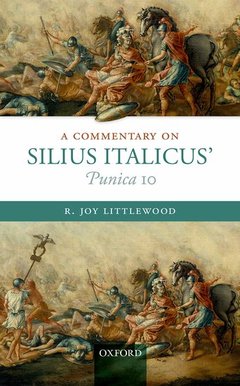Description
A Commentary on Silius Italicus' Punica 10
Author: Littlewood R. Joy
Language: English
Publication date: 02-2017
346 p. · 14.3x22.3 cm · Hardback
346 p. · 14.3x22.3 cm · Hardback
Description
/li>Biography
/li>
The Battle of Cannae represents a conflict of mighty powers and a crushing defeat, notoriously the worst in Rome's history. Dawn on 2 August 216 BC saw the armies of Rome and Carthage clash in what the participants hoped would be the decisive engagement for supremacy in Mediterranean trade and empire. Punica 10 opens with the final phase of the battle, when there lingered no hope of victory in the Roman ranks. The military narrative moves mercilessly through the aristeia and death of the heroic consul Paulus to the ghastly tableau of Roman defeat. But the mystique of Cannae lies in a paradox: that the army ignominiously vanquished emerges the ultimate victor. Although night falls on a battlefield littered with the wreckage of Rome's military might and a triumphant victor still unsated with Roman blood, the second half of the book unfolds a sequence of unexpected twists in the action which destabilize Hannibal's confidence and initiate acts of heroism inspiring fresh resolution in the traumatized Romans. In one of Silius' finest books, the climactic sweep of his epic is enriched by intertextual allusions to Virgil's great narrative of epic closure, Aeneid 12. In contrast to her earlier commentary on Punica 7, which explores intertexts associated with Hannibal's desecration of rural Italy, R. Joy Littlewood's new commentary focuses on Silius' military narrative; the poetics of defeat with its imagery of shipwreck and the spectacle of death in the Roman amphitheatre. It aims to show how a poet with long experience in politics as a senior senator in the first century AD interpreted Rome's historic disaster and eventual triumph in the light of his own experiences of civil war and a swift succession of Roman emperors. Presented here alongside the Latin text and translation, and supplemented with plans of the battlefield, this commentary offers both philological and stylistic exegesis together with historical analysis and up-to-date literary criticism. It is accompanied by an extended introduction including analyses of Silius' adaptation of Livy's Cannae narrative, of the contrasting moral strengths of his three Roman heroes, and of the ideas contained in the intertextually rich, exemplary epigram which closes Book 10.
Dr R. Joy Littlewood is an independent scholar based in Oxford, where she has been a member of the Centre for the Study of Greek and Roman Antiquity at Corpus Christi College for the last decade. Her early research in the late 1970s led to three pioneering articles on Ovid's Fasti followed by a commentary on Ovid's Fasti, Book 6 (Oxford University Press, 2006), which formed a major part of a doctorate by published work, awarded in 2007. Since then she has worked almost exclusively on Flavian epic, publishing a commentary on Silius Italicus' Punica 7 in 2011 with OUP and recently beginning another on Punica 3 alongside Antony Augoustakis. Among various other current projects, she has also undertaken to complete the fourth and final volume of Jim McKeown's monumental commentary on Ovid's Amores.
© 2024 LAVOISIER S.A.S.
These books may interest you

Abused Bodies in Roman Epic 107.80 €



